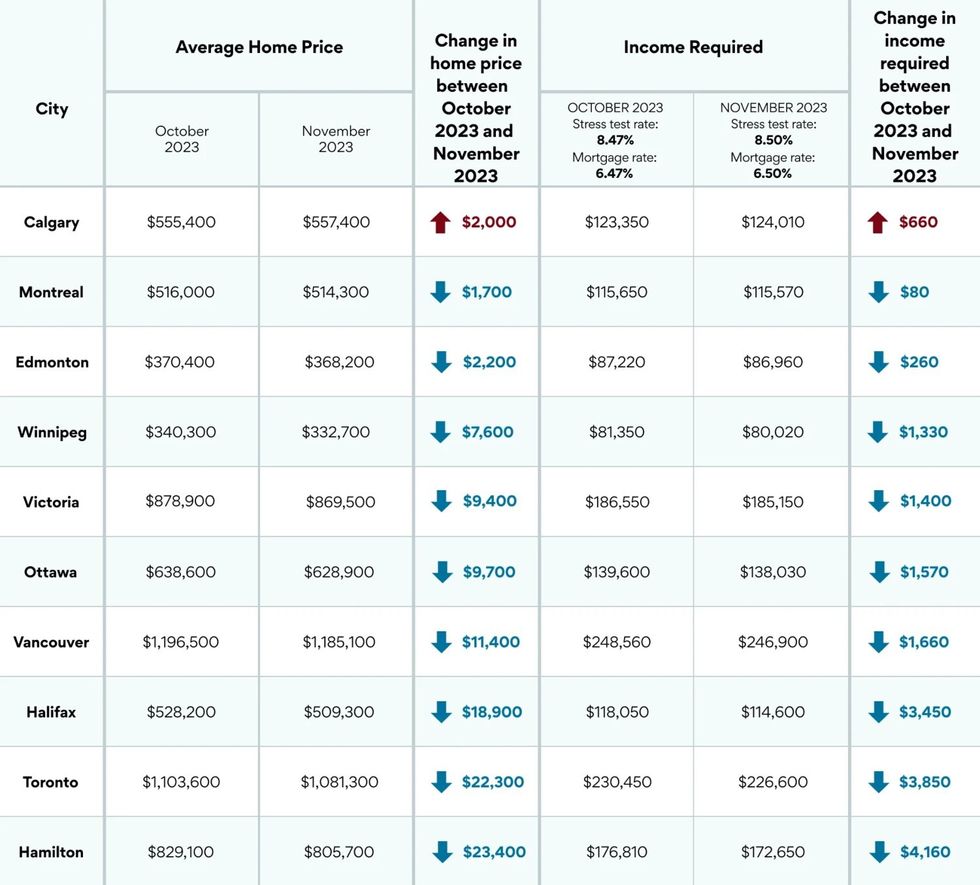Not too long ago, Calgary and Alberta at large were outliers when it came to housing affordability, with housing prices so low that the Government of Alberta constructed a big advertising campaign around it in an attempt to lure Canadians from other provinces into Alberta.
Now, at least after November, Calgary is an outlier for the opposite reason.
According to Rate Hub's latest affordability report, Calgary was the only major Canadian city where buying a home got a little tougher from October to November.
Using the combination of average home prices and average mortgage rates (based on the average five-year fixed rates at the Big Five Banks), Rate Hub identified the change in housing prices from October to November as well as the change in income it resulted in, and Calgary was the only city that saw an increase in housing prices — and thus the only city that saw a corresponding increase in income required.
Average home prices increased by $2,000 — from $555,400 to $557,400 — from October to November, while prices dropped in all other major cities. Housing prices decreased by $1,700 in Montreal, while Alberta's other major city, Edmonton, saw a decrease of $2,200. Meanwhile, other major cities such as Vancouver and Toronto saw housing prices decrease by over $10,000, according to Rate Hub.
And it's not just a matter of perspective where looking at the change doesn't tell the whole story and Calgary saw the largest price increase because it has the lowest housing prices in Canada. Looking at the housing prices themselves, Calgary is right in the middle, with four cities — Winnipeg, Edmonton, Halifax, and Montreal — having average home prices lower than Calgary's and five where they're higher.
Rate Hub found that mortgage rates increased from an average of 6.47% to 6.50% between October and November, upping the stress test rate from 8.47% to 8.50%. Thus, to account for the change in housing prices, an income increase of $660 was required for Calgarians, while residents of all other cities could get away with a decrease in income as a result of housing prices decreasing.

On the other end of the spectrum, Hamilton saw the greatest amount of relief when it came to housing affordability, with home prices dropping by an average of $23,400 from October to November. Toronto, which could sure use the relief, saw the second-greatest amount of relief, with home prices dropping by an average of $22,300.
More relief is also "on the horizon," Rate Hub said, as many economists and experts are expecting the Bank of Canada to decrease its policy interest rate sometime in the coming year, perhaps even multiple times.
On an even longer timeline, experts from TD now believe that the Bank of Canada could potentially drop its rate to as low as 2.25% by 2025, according to a forecast published last week. It remains to be seen, however, how much longer Calgary will continue to be an outlier.




















